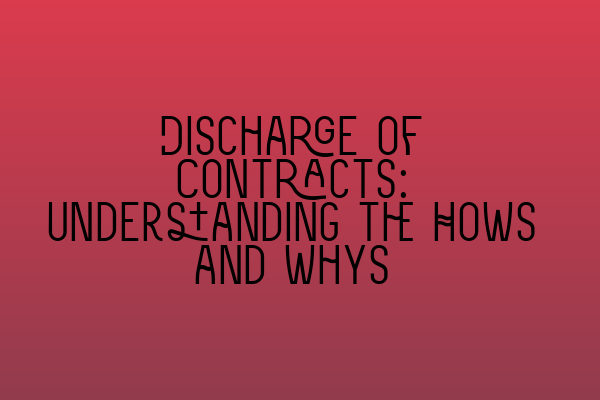Discharge of Contracts: Understanding the Hows and Whys
Contracts are an essential part of daily life, governing the relationships and agreements between individuals, companies, and organizations. However, there may come a time when these contracts need to be discharged or terminated. Understanding the hows and whys of contract discharge is crucial for every solicitor and individual involved in contract law.
In this article, we will explore the concept of discharge of contracts, the various methods of discharge, and the reasons why a contract may be discharged. So, let’s dive in!
1. What is Discharge of Contracts?
Discharge of contracts refers to the legal process of terminating or ending a contract, releasing the parties involved from their contractual obligations. It essentially marks the completion of the contract, relieving both parties of their duties and responsibilities.
2. Methods of Discharge:
There are several ways in which a contract can be discharged. Let’s take a closer look at the most common methods:
a. Performance: The contract can be discharged through performance when both parties fulfill their respective obligations as outlined in the contract. This is the most straightforward and ideal method of discharge.
b. Agreement: If both parties mutually agree to terminate the contract, it can be discharged through agreement. This may occur when circumstances change or when the original terms are no longer feasible or relevant.
c. Breach: A contract can be discharged through breach when one party fails to fulfill their obligations without a valid excuse. This may give the innocent party the right to sue for damages or terminate the contract.
d. Frustration: Frustration occurs when unforeseen events or circumstances make it impossible to perform the contract as originally intended. In such cases, the contract may be discharged due to frustration.
e. Operation of Law: Certain events, such as the death or bankruptcy of one of the parties, can lead to the automatic discharge of a contract. This discharge occurs by operation of law and is not dependent on the actions of either party.
3. Reasons for Discharge:
Discharge of contracts can occur for various reasons, and it is important to understand these reasons to effectively navigate the world of contract law. Here are a few common reasons why a contract may be discharged:
a. Mutual Agreement: As mentioned earlier, both parties involved in the contract may agree to discharge it for various reasons. This could be due to a change in circumstances or the realization that the contract is no longer viable.
b. Non-Performance: If one party fails to fulfill their contractual obligations, the other party may choose to discharge the contract due to the breach. Breach of contract can happen in different forms, such as non-payment, late performance, or failure to deliver goods or services as agreed upon.
c. Impossibility: Sometimes, unforeseen events or circumstances make it impossible to perform the contract. This could be due to natural disasters, government interventions, or other unavoidable circumstances. In such cases, frustration of the contract may lead to discharge.
d. Illegality: If the purpose or subject matter of the contract becomes illegal or against public policy, the contract may be discharged. It is important to ensure that contracts comply with all applicable laws and regulations.
e. Bankruptcy or Insolvency: In cases where one of the parties becomes bankrupt or insolvent, the contract may be discharged automatically. This ensures that the other party is not bound by a contract with someone who is unable to fulfill their obligations.
4. Seeking Legal Assistance:
Navigating the complexities of contract law and ensuring the proper discharge of contracts can be challenging. That is why it is essential to seek professional legal assistance from experienced contract solicitors. They can guide you through the process, advise you on the best course of action, and help protect your rights and interests.
To further enhance your understanding of contract law and prepare for the SQE exams, explore our related articles:
– SQE 1 Practice Exam Questions
– SQE 1 Practice Mocks FLK1 FLK2
– SQE 2 Preparation Courses
– SQE 1 Preparation Courses
– SRA SQE Exam Dates
In conclusion, the discharge of contracts is a vital aspect of contract law. Understanding the various methods of discharge and the reasons behind it is key to successfully navigating contractual relationships. Whether it’s through performance, agreement, breach, frustration, or operation of law, the discharge of a contract signals the end of the contractual obligations between the parties involved. Seeking legal assistance from contract solicitors is crucial to ensure proper discharge and protect your rights. Good luck in your journey through the fascinating world of contract law!
